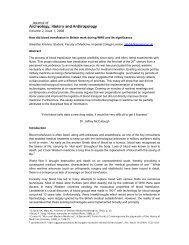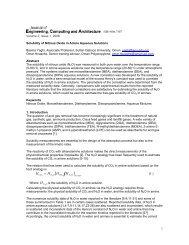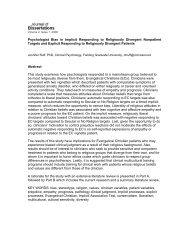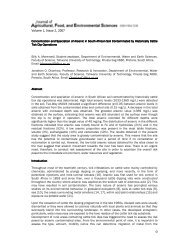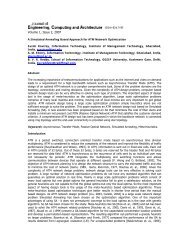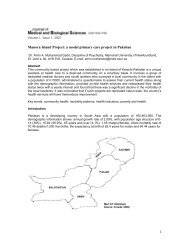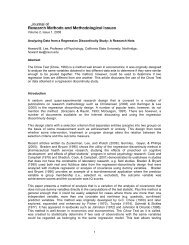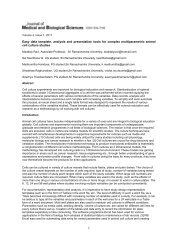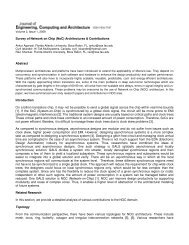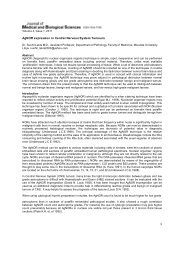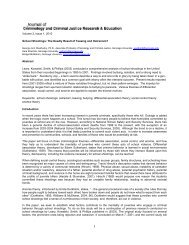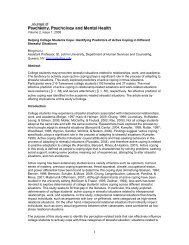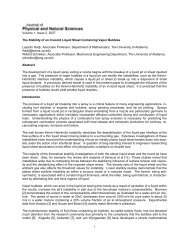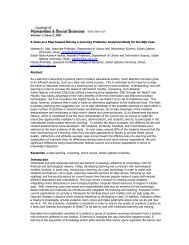The Heaven and Earth Society and the Red Turban Rebellion in ...
The Heaven and Earth Society and the Red Turban Rebellion in ...
The Heaven and Earth Society and the Red Turban Rebellion in ...
You also want an ePaper? Increase the reach of your titles
YUMPU automatically turns print PDFs into web optimized ePapers that Google loves.
failed to keep a unified military force for a long time with <strong>in</strong>terchangeable military comm<strong>and</strong>s or to achieve<br />
complete central control over appo<strong>in</strong>tments.<br />
<strong>The</strong> alliances of <strong>the</strong> various <strong>Red</strong> <strong>Turban</strong> groups were a normal part of Ti<strong>and</strong>ihui strategy; <strong>the</strong> unity<br />
achieved <strong>the</strong>reby was circumscribed by <strong>the</strong> need of <strong>in</strong>dividual leaders to reta<strong>in</strong> <strong>the</strong>ir followers’ loyalty.<br />
Although lesser leaders might recognize ano<strong>the</strong>r’s superior ability, <strong>the</strong>ir ultimate motivation was ei<strong>the</strong>r<br />
survival or self-advancement. In addition, muddle-headed leadership generated <strong>the</strong> political corruption that<br />
prevailed among <strong>the</strong> rebels. <strong>The</strong> leaders of <strong>Red</strong> <strong>Turban</strong> forces were often short-sighted; <strong>the</strong>y moved almost<br />
bl<strong>in</strong>dly here <strong>and</strong> <strong>the</strong>re as be<strong>in</strong>g without def<strong>in</strong>ite aims except perhaps those of seek<strong>in</strong>g for food to solve <strong>the</strong><br />
immediate problem, especially after <strong>the</strong>ir failures on <strong>the</strong> attack of Guangzhou. <strong>The</strong>y <strong>in</strong>tended to go to<br />
Guangxi, but some lacked <strong>the</strong> persistence to reach that goal. <strong>The</strong>refore, <strong>the</strong> major cause of <strong>the</strong> <strong>Red</strong><br />
<strong>Turban</strong>’s failure was its own <strong>in</strong>adequacy. While <strong>the</strong> <strong>Red</strong> <strong>Turban</strong> groups were gradually return<strong>in</strong>g to <strong>the</strong><br />
traditional state of disunion <strong>and</strong> non-co-operation, <strong>the</strong> government side made great progress. <strong>The</strong> Green<br />
Units were replaced by <strong>the</strong> newly tra<strong>in</strong>ed Hunan Braves who were better paid, better discipl<strong>in</strong>ed, better<br />
equipped, <strong>and</strong> endowed with a stronger fight<strong>in</strong>g power than <strong>the</strong> rebels. 153<br />
<strong>The</strong> second reason for <strong>the</strong> failure of <strong>Red</strong> <strong>Turban</strong> rebellions was disagreement among rebel leaders.<br />
One of <strong>the</strong> greatest weaknesses of <strong>the</strong> rebel forces <strong>in</strong> <strong>the</strong> campaigns aga<strong>in</strong>st <strong>the</strong> Q<strong>in</strong>g force was lack of<br />
harmony <strong>and</strong> cooperation among <strong>the</strong> rebel groups. 154 A rebels’ <strong>in</strong>ternal harmony varied accord<strong>in</strong>g to its<br />
fluctuat<strong>in</strong>g fortunes. Although Chen Kai, <strong>the</strong> rebel supreme leader surrounded himself with o<strong>the</strong>r Ti<strong>and</strong>ihui<br />
confederates right up to his death <strong>in</strong> 1861 at Xunzhou, <strong>the</strong> problem of ma<strong>in</strong>ta<strong>in</strong><strong>in</strong>g authority over his subleaders<br />
had always been a thorny one for him. Chen Xianliang’s experience provides useful examples. After<br />
fail<strong>in</strong>g to be a k<strong>in</strong>g of Dacheng k<strong>in</strong>gdom, Chen bore a grudge aga<strong>in</strong>st Chen Kai <strong>and</strong> returned back to<br />
Guangdong without follow<strong>in</strong>g Chen Kai’s force <strong>in</strong> Guangxi. 155 Li Wenmao was always on bad terms with<br />
Chen Kai. For <strong>in</strong>stance, Li played safe to protect his own headquarters at Liuzhou 柳 州 <strong>and</strong> refused to<br />
cooperate with Chen Kai to protect Xunzhou from <strong>the</strong> counter attack of Q<strong>in</strong>g force <strong>in</strong> 1861. 156 <strong>The</strong>se are only<br />
a few examples of <strong>the</strong> bad relations that prevailed among <strong>the</strong> rebel leaders fight<strong>in</strong>g <strong>the</strong>ir common foe. <strong>The</strong><br />
disagreements among rebel leaders naturally caused <strong>the</strong> lack of coord<strong>in</strong>ation <strong>in</strong> <strong>the</strong> fight<strong>in</strong>g. 157 Dur<strong>in</strong>g <strong>the</strong><br />
protracted attack aga<strong>in</strong>st Guangzhou, <strong>the</strong>re was frequent disagreement <strong>and</strong> disorganization among <strong>the</strong><br />
rebel groups near <strong>the</strong> front, <strong>and</strong> that gave <strong>the</strong> Q<strong>in</strong>g force <strong>the</strong> time to br<strong>in</strong>g <strong>in</strong> more forces from o<strong>the</strong>r<br />
prov<strong>in</strong>ces. 158 In 1861, <strong>the</strong> Governor-General of Liang’guang <strong>in</strong> tak<strong>in</strong>g advantage of <strong>the</strong> <strong>in</strong>ternal trouble of <strong>the</strong><br />
rebels, summoned troops from Hunan to destroy <strong>the</strong> rebel front. 159 On <strong>the</strong> basis of presently available<br />
material, one may conclude that although <strong>the</strong> <strong>Red</strong> <strong>Turban</strong>s did have a united force, it was not very solid or<br />
systematic.<br />
Ano<strong>the</strong>r reason for <strong>the</strong> <strong>Red</strong> <strong>Turban</strong> military failure was that <strong>the</strong>y did not have enough soldiers <strong>and</strong><br />
weapons to enlarge <strong>the</strong>ir rebellion. Nor was <strong>the</strong> <strong>Red</strong> <strong>Turban</strong> army a professional one, be<strong>in</strong>g composed<br />
ma<strong>in</strong>ly of marg<strong>in</strong>alized w<strong>and</strong>er<strong>in</strong>g people. 160 Even though <strong>the</strong>y claimed to have a huge follow<strong>in</strong>g <strong>and</strong> <strong>the</strong><br />
imperial government officials reported large rebel armies <strong>in</strong> order to gloss over <strong>the</strong>ir own defeats, <strong>the</strong> actual<br />
<strong>Red</strong> <strong>Turban</strong> combatants were not large <strong>in</strong> number. From beg<strong>in</strong>n<strong>in</strong>g to end, most records about rebel<br />
numerical strength are exaggerated. <strong>The</strong> total number of <strong>the</strong> <strong>Red</strong> <strong>Turban</strong> rebels who participated <strong>in</strong> <strong>the</strong> first<br />
153 Zheng Piex<strong>in</strong> 郑 佩 鑫 , “Dacheng’guo de fanq<strong>in</strong>g qiyi 大 成 国 的 反 清 起 义 ,” <strong>in</strong> Shixue yuekan 史 学 月 刊<br />
(Henan renm<strong>in</strong> chubanshe, Dec. 1958), 19.<br />
154 F.O. 931.1468 Intelligence report on disagreement among rebel leaders (1854).<br />
155 Hu, Q<strong>in</strong>gdai Hongmenshi, 320.<br />
156 Chen Kai, after establish<strong>in</strong>g his rebel government, m<strong>in</strong>ted new money, “Hongfu tongbao 洪 福 通 寶 .”<br />
<strong>The</strong> fact that Li Wenmao circulated his own money, “P<strong>in</strong>gj<strong>in</strong>g shengbao 平 靖 勝 寶 ” while he was still <strong>in</strong><br />
collaboration with Chen to fight aga<strong>in</strong>st Q<strong>in</strong>g force <strong>in</strong>dicated <strong>the</strong> uneasy relations between Chen <strong>and</strong> Li as<br />
well. See “Chen Song shiyou 陈 松 事 由 ,” <strong>in</strong> Hongb<strong>in</strong>g Qiyi, 212-213; “Gufei zonglu 股 匪 总 录 ,” <strong>in</strong><br />
Hongb<strong>in</strong>g Qiyi, 824-830.<br />
157 <strong>The</strong> authorities were equally aware of this fact, <strong>and</strong> frequently exploited it <strong>in</strong> attempts to put down <strong>the</strong><br />
rebels. See Wang X<strong>in</strong> 王 鑫 , Wang’zhuang wugong weiji 王 壮 武 功 违 集 , 13.319 (1892).<br />
158 Foreigners observed that ‘<strong>the</strong>re seems no unity of purpose nor comb<strong>in</strong>ed action among <strong>the</strong> different<br />
b<strong>and</strong>s of rebels.’ See F.O. 17.218, Bowr<strong>in</strong>g-Clarendon, Desp. 235, (Dec. 23, 1854).<br />
159 Hu, Q<strong>in</strong>gdai hongmenshi, 318-320.<br />
160 Zhou Yum<strong>in</strong> 周 育 民 , Zhong’guo banghuishi 中 国 帮 会 史 , (Shanghai: Shanghai renm<strong>in</strong> chubanshe,<br />
1993), 154.<br />
24



